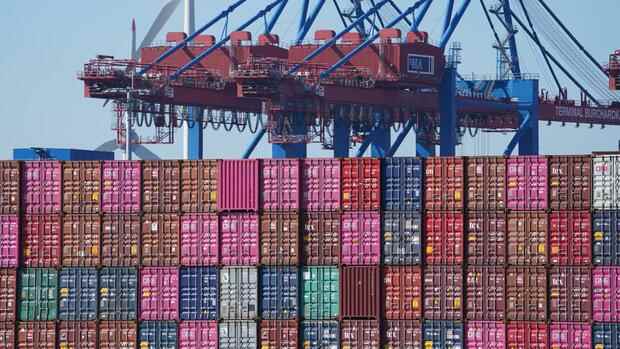The prospects of the Ifo economists have clearly deteriorated.
(Photo: dpa)
Munich, Berlin The Ifo Institute is more skeptical of the German economy because of the worsening virus pandemic. The gross domestic product (GDP) should grow by only 3.7 percent instead of 5.1 percent in 2022, after an expected increase of 2.5 percent this year, as the Munich economic researchers announced on Tuesday.
“The ongoing supply bottlenecks and the fourth corona wave are noticeably slowing down the German economy,” said Ifo economic director Timo Wollmershäuser. “The strong recovery initially expected for 2022 will be postponed further.” GDP is expected to grow by 2.9 percent in 2023, almost twice as much as expected in September.
In the current quarter, the gross domestic product is likely to shrink by 0.5 percent compared to the previous quarter and only stagnate at the beginning of 2022, the institute estimates. “In the summer of 2022, with the ebb of the corona wave and the gradual end of the delivery bottlenecks, a strong recovery will set in,” said Wollmershäuser. The increase in GDP is then likely to accelerate significantly with growth rates of 2.3 percent in the second and 1.8 percent in the third quarter of 2022.
Unlike most experts, the Ifo is now even expecting inflation to continue to rise in the coming year, which is currently at 5.2 percent, its highest level in almost 30 years. Accordingly, the inflation rate is likely to rise from 3.1 percent this year to 3.3 percent in 2022.
Top jobs of the day
Find the best jobs now and
be notified by email.
“Rising costs associated with delivery bottlenecks play a driving role, as does the delayed adjustment to the increased energy and raw material prices,” explained the government advisors. The rise in consumer prices should not normalize to 1.8 percent until 2023.
According to Ifo, the unemployment rate will fall from an expected 5.7 percent in 2021 to an average of 5.2 percent in 2022 and 4.9 percent in 2023. The number of people in employment is therefore likely to increase by around 409,000 in the next year and then by 311,000. At the same time, short-time working will decrease from an estimated 1.7 million employees on average this year to 74,000 by 2023.
For the state budget, the Ifo estimates a deficit of 162 billion euros this year due to the corona. The budget gap is likely to decrease to a good 80 billion euros in 2022 and to around 20 billion euros in 2023.
Federal government prepares business for hard winter
The monthly report published by the Ministry of Economic Affairs on Tuesday fits in with the assessment of the Ifo Institute. According to the federal government, the German economy has to prepare for a hard Corona winter. “In view of the current pandemic, the economic risks have recently increased again,” it says.
In the current fourth quarter, economic output is therefore likely to be “rather weak”. The reason for this is the infection process, which should again slow down the recovery of the service providers over the summer. Restrictions such as 2G rules mainly affect the hospitality industry, and to a lesser extent also the retail sector.
In the industry, persistent delivery bottlenecks and high procurement costs also had a negative impact. This slowed production despite the good order situation. “If the delivery bottlenecks resolve over the next year, there will be a significant acceleration in the economic recovery,” said the Ministry for Economic Affairs and Climate Protection, which has been headed by Green Robert Habeck since last week.
Inflation is expected to ease, which at 5.2 percent in November was higher than it has been in almost 30 years. “At the beginning of next year, after the special effects have expired, the upward trend in consumer prices is likely to weaken again noticeably,” said the ministry. These include VAT, which was lowered in the second half of 2020 in the fight against the Corona recession and is now back at the old level. That has fueled the rise in prices in the past few months.
According to the forecast of the federal government, the upswing in Germany in the coming year is likely to be a number smaller than originally thought. It lowered its growth forecast a few weeks ago to 2.6 percent from 3.5 percent previously. In 2022 there should be an increase of 4.1 percent, and then 1.6 percent in 2023. This means that the estimates of the federal government and the Ifo Institute diverge significantly in some cases.
More: The risk of recession in Germany is increasing
